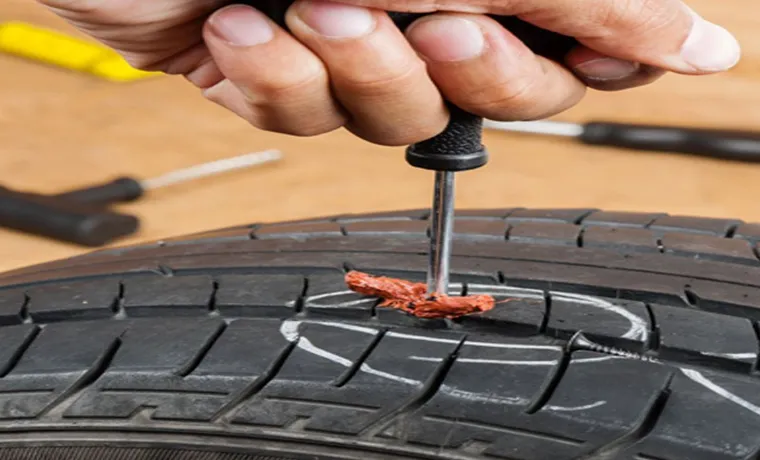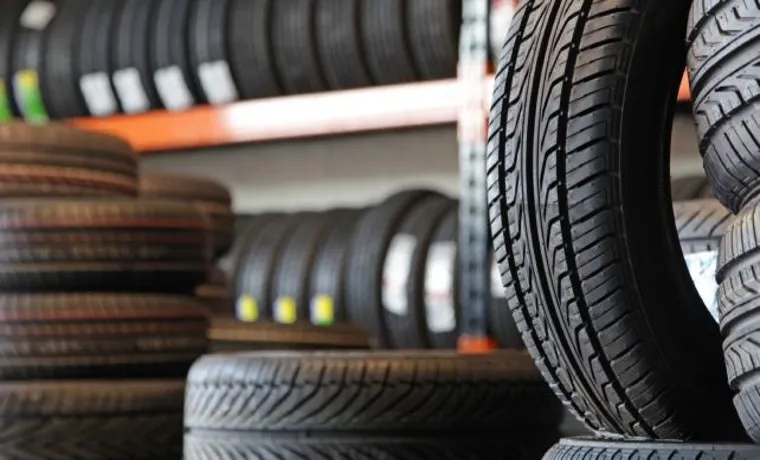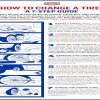Have you ever been driving down the road and suddenly feel that dreaded thud? You know the one – when you ran over a sharp object and now have a flat tire. Not only is this a major inconvenience, but it also means you have to figure out the tire repair cost. But how much should you expect to pay for a tire repair? And what factors affect the cost? In this blog, we’ll cover the ins and outs of tire repair costs so you can be prepared the next time you find yourself stuck on the side of the road.
So buckle up and let’s dive in!
Table of Contents
Factors That Affect Tire Repair Cost
When it comes to repairing a tire, the cost can vary depending on several factors. The size and type of the tire is one of the main factors that can affect the cost. Larger tires, such as those found on trucks or SUVs, tend to cost more to repair than smaller tires.
Another factor that plays into the cost is the severity of the damage. A small puncture can be easily plugged and is relatively inexpensive to repair, whereas larger or more extensive damage may require the tire to be replaced entirely. Additionally, the age of the tire can also impact the repair cost.
Older tires may be more difficult to find a match for, and the cost of replacement parts may be higher. Overall, the cost to repair a tire can range from around $20 for minor damage to several hundred dollars for more severe damage or complete replacement.
– Type of Tire Damage
Tire Repair Cost One of the main factors that affect tire repair cost is the type of damage the tire has sustained. Minor punctures and nails in the tread can usually be repaired for a reasonable cost, often around $20-$30, depending on the location and severity of the damage. However, more significant damage such as sidewall bulges or tire separation may require a full replacement, which can easily cost upwards of $100 or more.
Additionally, the type and quality of the tire being repaired can also affect the cost, with high-performance tires or large, specialized sizes typically being more expensive to repair. Ultimately, the cost of repairing a tire will depend on a variety of factors, including the type of vehicle, the type of tire, and the extent of the damage, so it’s important to consult with a professional mechanic or tire repair specialist to accurately assess the cost and options for repair.

– Tire Size
When it comes to tire repair, there are several factors that can affect the cost. One of the most significant factors is the tire size. Smaller tires, such as those on compact cars, are typically less expensive to repair than larger tires found on SUVs or trucks.
This is because larger tires require more materials and time to repair, which drives up the cost. Another factor that can impact the cost of tire repair is the type of tire. For example, high-performance tires are often more expensive to repair because they require specialized equipment and expertise.
Additionally, the severity of the damage can play a role in determining the cost of repair. A minor puncture can often be repaired for a reasonable price, but a more significant issue, such as a sidewall puncture or worn tread, may require a full tire replacement. Overall, it’s essential to consider these factors when assessing the cost of tire repair to ensure that you’re getting a fair price.
– Type of Tire
When it comes to tire repair cost, one of the key factors that contribute to the expense is the type of tire you have. Different types of tires have different repair costs, as it depends on the size, style, and materials used. For instance, run-flat tires tend to be more expensive to fix because of their reinforced sidewalls that help keep the tire inflated even when punctured.
Similarly, high-performance tires may require additional specialized equipment and tools to repair, which can increase the overall cost. On the other hand, all-season tires or standard passenger tires are typically less expensive to fix due to their more basic construction. In addition, the condition of the tire also affects the repair cost.
Tires that are extensively worn or have significant damage may require more work to repair, leading to higher expenses. Ultimately, the best way to determine the repair cost for your tire is to get a professional assessment from a reputable tire repair shop. They can evaluate your specific tire and provide an estimate for the cost of repair or replacement.
Typical Tire Repair Costs
If you’re wondering how much it costs to repair a tire, it really depends on the type and severity of the damage. For a simple puncture or nail, you can expect to pay around $10 to $30 for a patch or plug. However, if the damage is more extensive, such as a sidewall tear or a bulge in the tire, it may require a full replacement, which can cost anywhere from $50 to $200 or more depending on the make and model of your vehicle and the type of tire you need.
It’s important to note that repairing a tire is not always possible or recommended, especially if the damage is in a critical area or the tire is too worn down. In these cases, your best course of action may be to replace the tire altogether. Be sure to have any tire damage inspected by a professional to determine the best course of action.
– Patching a Tire
When it comes to tire repair costs, patching a tire is one of the more affordable options. On average, patching a tire can cost anywhere from $20 to $40, depending on the size of the puncture and the location of the tire. This type of tire repair involves removing the damaged area from the tire and inserting a patch on the inside to seal the hole.
It’s important to note that not all punctures can be patched, and if the damage is too severe or in the sidewall of the tire, the entire tire may need to be replaced. However, if the puncture is small and in a repairable area, patching can be a quick and cost-effective solution to keep your vehicle on the road.
– Plugging a Tire
If you’ve ever experienced a flat tire, you know how frustrating it can be. Not only can it be dangerous, but it can also be pricey to get it fixed. For a simple tire plug repair, you can expect to pay anywhere from $10-$30.
This easy fix involves inserting a rubber plug into the punctured area of the tire, which seals the hole and prevents air from escaping. However, it’s important to note that tire plug repairs are only recommended for small punctures and should not be used for larger holes, punctures near the sidewall, or tires that have been driven while flat. In those cases, a tire replacement may be necessary.
Overall, investing in routine tire maintenance, such as regularly checking tire pressure and tread depth, can ultimately save you money in the long run.
– Tire Replacement
Tire replacement can be a costly expense for car owners. The cost of tire repairs depends on several factors, including the type of tire and the extent of the damage. Generally, the cost of a tire repair ranges from $10 to $30 for a patch or plug, while full tire replacements can cost anywhere from $100 to over $500.
Other factors that can affect tire repair costs include the make and model of the car, tire size, and whether a tire is under warranty. It is important to regularly inspect your tires for wear and tear to help prevent costly tire repairs and replacements. In addition, proper tire maintenance, such as regular tire rotations and maintaining proper tire pressure, can also extend the life of your tires and save you money in the long run.
So, if you want to avoid unnecessary costs, be sure to give your car and its tires the proper care and attention they deserve.
Finding a Good Tire Repair Shop
If you’re wondering how much it costs to repair a tire, the answer can vary depending on where you go and what kind of repair is needed. A patch or simple plug can be less expensive than having to replace the entire tire. It’s important to find a reliable tire repair shop that can accurately diagnose the issue and provide a fair quote.
Look for shops that have good customer reviews, certifications, and use quality equipment. Some shops may offer a warranty or guarantee on their repairs, which can give you peace of mind. It’s also worth asking about any additional services, such as tire rotation or balancing, to ensure optimal tire performance and longevity.
Remember, taking care of your tires can save you money and keep you safe on the road.
– Ask for Recommendations
When it comes to finding a good tire repair shop, one of the best things you can do is ask for recommendations. Talk to friends, family, and colleagues who have had good experiences with tire repair shops in your area. They’ll be able to tell you which shops have great customer service, fair prices, and quick turnaround times.
You can also check online reviews to see what other people are saying about local tire repair shops. Just remember to take any negative reviews with a grain of salt, as people are more likely to leave reviews when they have a negative experience. By getting recommendations from people you trust and doing some research online, you’ll be able to find a reliable tire repair shop that you can count on when you need it.
So don’t be afraid to reach out and ask for recommendations – you never know who might have the inside scoop on the best tire repair shop in town!
– Check Shop Reviews
When it comes to finding a good tire repair shop, one thing to always keep in mind is to check shop reviews. By doing so, you can get an idea of the level of service you can expect, as well as the overall reputation of the shop. Look for feedback from past customers regarding the quality of work performed, the friendliness of the staff, and the timeliness of repairs.
Also, pay attention to any recurring themes, both positive and negative, as these can provide insight into the shop’s strengths and weaknesses. Remember, just because a shop has a few negative reviews doesn’t necessarily mean it’s a bad choice, especially if their positive reviews outweigh the negative. By taking the time to do your research and thoroughly review the feedback provided, you can be confident in your choice of tire repair shop and avoid any potential headaches in the future.
Conclusion
In conclusion, the cost to repair a tire can vary depending on the severity of the damage and the model of the tire. It’s always best to get an expert opinion and shop around for the best price, just like any good bargain hunter. And while a flat tire may put a damper on your day, it’s a gentle reminder that sometimes in life, we all need a little repair work.
Just remember, a patched tire is like a scar – a testament to the resilience and strength of both you and your vehicle.”
FAQs
How much does it typically cost to repair a tire?
The cost of repairing a tire can vary depending on the severity of the damage and the type of tire. Generally, a simple puncture repair can cost anywhere from $10 to $30.
Is it cheaper to repair a tire or replace it?
In most cases, it is cheaper to repair a tire rather than replace it. However, if the damage is too severe and the tire cannot be repaired, then a replacement may be necessary.
What are some common reasons that a tire needs to be repaired?
Some common reasons that a tire may need to be repaired include punctures from nails or other sharp objects, slow leaks from wear and tear, or damage caused by hitting a curb or pothole.
Can I repair a tire myself or should I take it to a professional?
It is recommended to take the tire to a professional to ensure that it is properly repaired and safe to drive on. Attempting to repair a tire yourself can result in further damage or a subpar repair job.
How long does it typically take to repair a tire?
The amount of time it takes to repair a tire can vary depending on the severity of the damage and how busy the repair shop is. Generally, a simple puncture repair can be completed in 30 minutes to an hour.
Will my tire warranty cover the cost of a repair?
Tire warranties typically do not cover repairs for damage caused by road hazards or user error. However, it is always worth checking with the tire manufacturer for specific details on your warranty.
Should I repair a tire that has been repaired before?
It is not recommended to repair a tire that has already been repaired multiple times. This can weaken the tire and make it more prone to failure. If in doubt, it is best to replace the tire.



